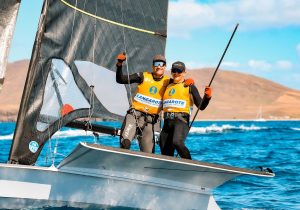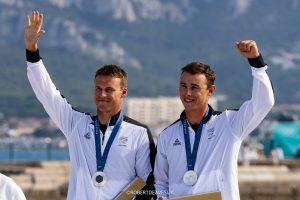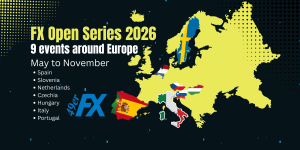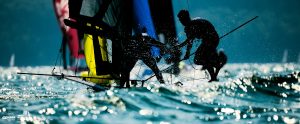Junior World Champion in the 49erFX | Physiotherapy Student | Nacra 17 Sailor for Austria | Ironman Finisher
At just 22 years old, Clara-Sofia Stamminger de Moura is already a standout figure in the world of competitive sailing—and beyond. Recently, she made headlines with her bold decision to transition from the 49erFX, where she sailed for France and became a junior world champion alongside Manon Peyre, to the highly technical Nacra 17 class. But that’s not all—she’s also switched countries and will now represent Austria with her new sailing partner, Lukas Haberl, a Paris Olympic sailor.
We reached out to Clara because her story is nothing short of inspiring. Despite her young age, she’s proven time and again that she’s unafraid to take risks and challenge herself, whether it’s making a major career change, training for and completing a half Ironman in just a few months, or juggling her physiotherapy studies in Paris with the demands of professional sailing.
With a bright future ahead, Clara-Sofia is a true role model for young women, demonstrating resilience, determination, and the courage to embrace new opportunities. Here’s what she had to say about her journey so far and what’s next for her on and off the water.

Early Life and Multicultural Roots
- Clara, your story is fascinating. Can you share more about your upbringing and what shaped you into the person and athlete you are today?
I grew up by the sea in a family that valued curiosity and perseverance, so it’s no surprise I was drawn to the outdoors and the thrill of physical challenges. With my family’s encouragement, I tried all kinds of sports before discovering my true passion: sailing.
When we moved from Portugal to France in 2013, everything changed. I went from the calm of coastal life to the hustle of a big city. It wasn’t easy, but sailing became my escape—a way to reconnect with nature almost every weekend.
Sailing taught me so much: discipline, resilience, and how to balance the demands of school with elite competition. It sharpened my focus, improved my time management, and gave me the confidence to tackle challenges head-on.
Looking back, I’m incredibly grateful for the journey so far and how these experiences have shaped the person I am today.
- You’re known to speak multiple languages—English, French, Portuguese, and more! Can you tell us where your multicultural background comes from? How has it influenced your life and career in sailing?
I was born in Paris, but my childhood was anything but rooted in one place. When my mom worked abroad, I started kindergarten in Romania, and later I attended primary school in Portugal, my dad’s home country. At home, we spoke French, I picked up Portuguese in Portugal, and I learned English at school. With Austrian roots on my mom’s side, I gained Austrian citizenship a few years ago—now I have to tackle learning German!
My sailing journey began in Porto when I was 8, all thanks to my mom. I spent weekends at the Clube Naval de Leça, falling in love with the sport. When we moved back to Paris, I kept at it. Portugal was where it all started, and sailing Optimist regattas in Holland, Belgium, and Spain not only sharpened my skills but also improved my English.
Neither of my parents were sailors, so this path came about by chance. But their support, along with incredible coaches and teammates, made all the difference in shaping my passion and growth.
Sailing for France and Transition to Austria
- You’ve been a prominent part of the French sailing team with Manon Peyre, achieving incredible milestones like becoming junior world champions in the 49erFX. How many years did you sail for France, and what do you feel most proud of from that time?
After moving from Portugal to France in 2013, I continued sailing in Paris, starting with the Optimist before transitioning to the 420 and later, in 2020, to the 49erFX. I sailed for France for 12 years, and the last four years in the 49erFX taught me a great deal about pursuing an Olympic campaign while also balancing my development as both an athlete and a student.
What I’m most proud of from that time is our U23 World Championship title. It was such an unexpected achievement, and I think that’s what made it even more special.
- Your decision to transition from the 49erFX to the Nacra 17 is a bold one, especially moving from France to represent Austria. What inspired this major change, and how did the partnership with Lukas Haberl come about?
Moving to the Nacra 17 has been a significant change, especially while transitioning to a new country. Initially, I wasn’t planning to switch boats, but after some discussions and time to reflect, I decided to take the leap and embrace the opportunity.
The partnership with Lukas was somewhat unexpected for both of us. To be honest, I never saw myself moving into the Nacra 17 at first. It all started when I joined Lukas for a fun ride during holidays. I instantly enjoyed the boat.
Later, Lukas, who was looking for a new crew, asked if I would consider doing a campaign with him. Given the connection we had on and off the water, I took some time to think it over, and ultimately, I decided to go for it.
So far, I’m really excited about this new journey, and I’m looking forward to everything this campaign has in store for us!
- The Nacra 17 is known to be one of the most technically demanding boats. How are you preparing for this steep learning curve, especially starting from scratch in a new class?
The Nacra 17 is definitely a challenging boat, and since I’m starting from scratch in this class, I know the learning curve will be steep. So far, I haven’t spent much time sailing on it, so my main focus in the coming months will be spending as many hours as possible on the water to get used to it and learn it. Fortunately, I have a great team around me who’s helping me to learn quickly! So, I would say that putting in hours on the water will be crucial in the months ahead, along with dedicating time to the gym, as the Nacra 17 demands a lot of physical strength.
Breaking Up the Dream Team
- You and Manon Peyre were such a successful team and had great momentum. Many would say you had a strong chance of qualifying for Los Angeles 2028. Why did you decide to part ways, and how difficult was that decision?
We shared some great moments with Manon, and I’m truly grateful for that. One of the key challenges that led us to part ways was the difficulty in gaining weight, along with some missing elements in our collaboration. I believe we both learned a lot during this campaign, especially since it was our first.
It wasn’t an easy decision at all. It involved a lot of reflection and considering the best path forward for both of us. It was a difficult choice, but only time will tell us if it was the right decision but for now, I’m just looking forward the next months over my new project.
- Looking back at your partnership, what was the most rewarding part of sailing with Manon, and what will you miss most about working with her?
Looking back at my partnership with Manon, the most rewarding part was the synergy we built over time. Our ability to push through challenges as a team. What I’ll miss most about working with her is her positivity and the great moments we shared. She brought a lot of energy and enthusiasm into the project.
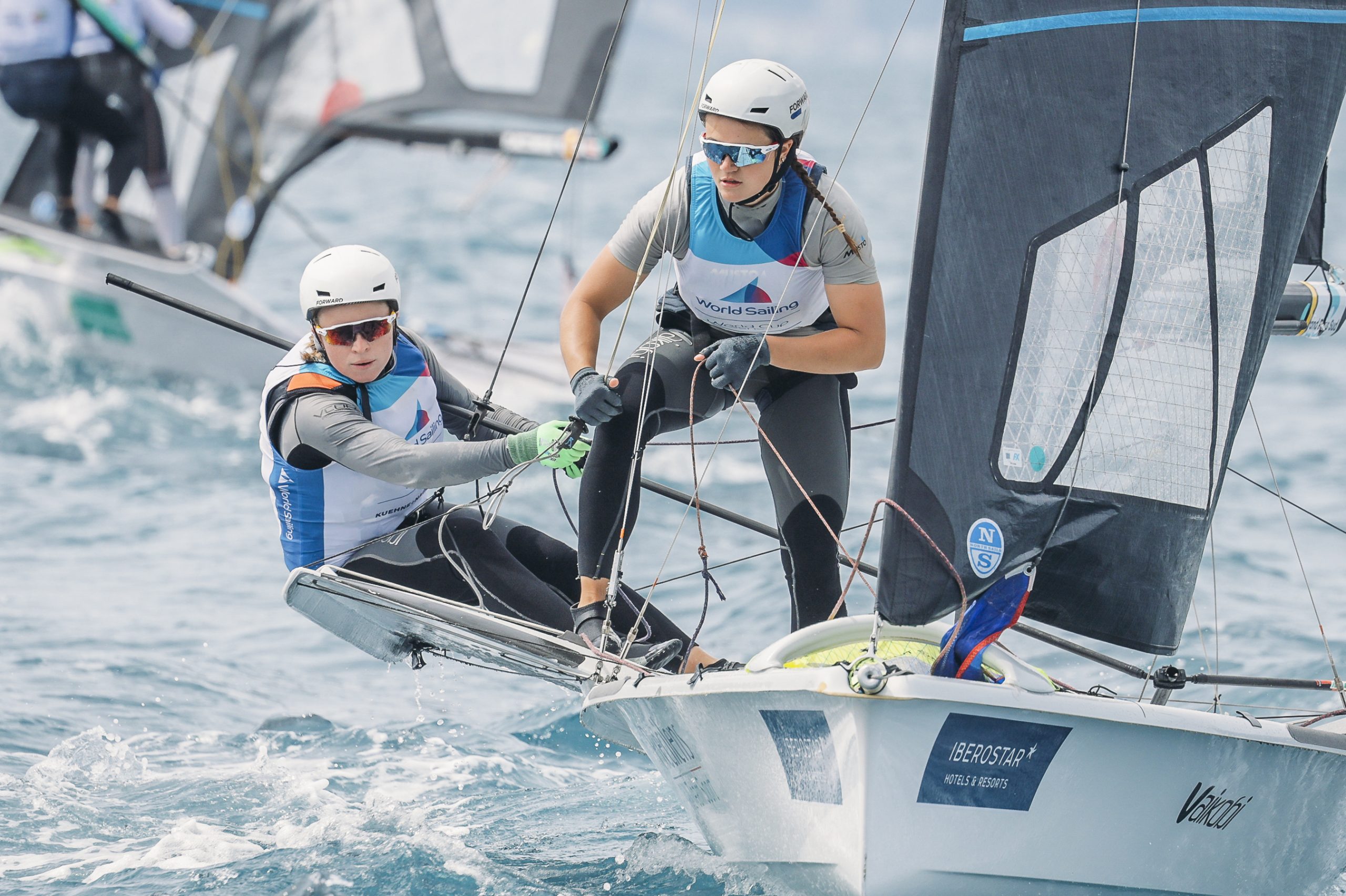
05 April, 2024
Balancing Sailing, Studies, and More
- You’re currently studying physiotherapy in Paris, which is a demanding field. How do you balance your studies with the rigorous demands of competitive sailing?
Balancing physiotherapy studies with competitive sailing has been a unique challenge, but I’ve found ways to make it work. Since I’m not in class much of the time, I rely on my teammates to share lessons and notes. I try to fit studying into my schedule by working either before or after training sessions. It’s not always the most relaxing routine, sometimes it can even be stressful, but once you get into the rhythm, it becomes a habit you get use to.
Luckily, I’m in my final year, and if all goes well, I’ll graduate in July! That said, I have to admit I’m really looking forward to graduating. It’ll be such a relief to put exams and assignments behind me and dedicate myself entirely to sailing without those extra worries. Until then, I’m staying focused and making the most of every opportunity to balance both worlds. That thought keeps me motivated, knowing I’m so close to finishing this chapter and being able to fully focus on my Olympic campaign.
- On top of everything else, you completed a half Ironman after training for just a couple of months! What motivated you to take on such a challenge, and what did you learn about yourself through that experience?
I had always dreamed of competing in a Half Ironman, but with my busy schedule, balancing sailing and studying, it was hard to find the right time. I thought, why not now, in between two Olympic campaigns. So, I decided to finally go for it.
I already knew several people who had participated in triathlons, and hearing their stories was truly inspiring, giving me even more motivation to go for it. What made it even more appealing was my love for the three sports involved. While sailing, I couldn’t do much cardio because I needed to maintain my weight, so this was a refreshing change. It gave me the chance to focus on fitness without worrying about weight management and to simply enjoy doing something different.
The idea of pushing my limits, testing my resilience, and achieving something I had always dreamed of was incredibly motivating. It was also exciting to take on the challenge with a friend, which made the journey even more rewarding.
What I learned during the preparation is that motivation alone isn’t enough over time—you need discipline. On tough days, when I felt tired, lazy, or unmotivated, sticking to the training routine was essential. Consistency is key, and it truly makes the biggest difference. At the same time, I learned to listen to my body and not push too hard when rest was necessary.
I also discovered how to push my physical limits in ways I hadn’t thought “possible”. I realized I’m capable of achieving far more than I initially believed, uncovering a whole new level of resilience and strength within myself. For sure it won’t be my last one!
- With so many commitments, how do you manage stress and avoid feeling overwhelmed? Do you have specific strategies or routines that keep you grounded and focused?
I did feel overwhelmed at times during the last campaign, but it taught me an important lesson: to listen to my body and mind and recognize when I need to “stop pushing” and take a step back. I’ve realized that organization and time management are key to maintaining balance. Having a structured schedule, setting clear priorities, and focusing on what truly matters have been incredibly helpful.
I’ve also found that taking time for myself is essential,whether it’s doing activities I enjoy or spending quality time with friends and family. These moments allow me to step back, recharge, and be fresh again.
By combining these routines with flexibility and hard-work, I’m better able to manage stress, stay focused, and be ready for what’s coming.
Future Goals
- Looking ahead, what are your main goals with Lukas in the Nacra 17? Are the LA 2028 Olympics part of the dream?
Looking ahead, my main goals with Lukas in the Nacra 17 are to build a strong, cohesive team, continually develop our skills, and compete at the highest level. We want to work hard, enjoy the process, and push ourselves to achieve great results.
The LA 2028 Olympics are absolutely part of the dream. It’s a long-term goal that drives and motivates us every day. While there’s still a lot of hard work, learning, and steps to take, we are fully committed to this journey. Qualifying for the Olympics and representing our country would be an incredible achievement, and we’re determined to give it our all to turn that dream into reality.


